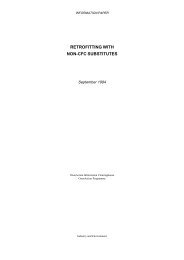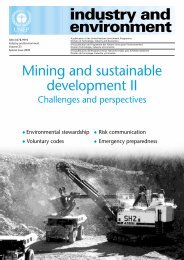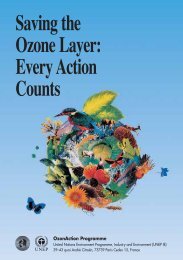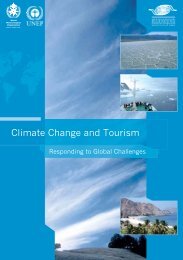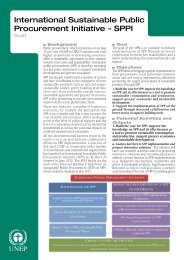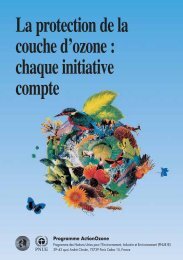industry and environment - DTIE
industry and environment - DTIE
industry and environment - DTIE
Create successful ePaper yourself
Turn your PDF publications into a flip-book with our unique Google optimized e-Paper software.
N e w s<br />
ered paper to make their products, with 37% of<br />
the raw material for new paper coming from<br />
recovered paper.<br />
In 2002 AFPA adopted the goal of recovery of<br />
55% of all paper consumed in the United States<br />
by 2012. Through public <strong>and</strong> private sector partnerships,<br />
it has launched educational campaigns<br />
to encourage the recovery of more high-quality<br />
papers in communities <strong>and</strong> workplaces.<br />
For more information, see www.af<strong>and</strong>pa.org/<br />
Content/NavigationMenu/Environment_<strong>and</strong>_Recy<br />
cling/Recycling/Recycling.htm.<br />
◆<br />
Recycling electronic waste<br />
The decision by computer equipment manufacturer<br />
Hewlett Packard to recycle electronic waste<br />
worth US$ 1.8 billion by the year 2007 has been<br />
greeted positively by <strong>environment</strong>al groups in the<br />
United States. “It is a step in the right direction,<br />
but the company has a long way to go,” said Ted<br />
Smith, Executive Director of Silicon Valley Toxics<br />
Coalition (SVTC), a San Jose-based <strong>environment</strong>al<br />
group that conducts research <strong>and</strong> is an advocate<br />
for <strong>environment</strong>al issues related to high tech <strong>industry</strong>.<br />
According to Smith, a billion <strong>and</strong> a half dollars’<br />
worth of electronic products <strong>and</strong> printing supplies<br />
translates into roughly 20 million computers to be<br />
recycled over the next two <strong>and</strong> half years. “We have<br />
found that most manufacturers couldn’t provide<br />
recycling data for their US programmes, or their<br />
recycling rates were below 2%. What’s important is<br />
to compare the number of computers <strong>and</strong> printer<br />
supplies recycled by HP compared to the $76 billion<br />
in sales last year,” he added. “It’s encouraging<br />
to see that HP has combined recycling goals with<br />
concerns about raising social <strong>and</strong> <strong>environment</strong>al<br />
st<strong>and</strong>ards in the supply chain. [But they] can do<br />
more harm than good if it is done in an <strong>environment</strong>ally<br />
or socially irresponsible manner.”<br />
SVTC, along with some other <strong>environment</strong>al<br />
organizations, has launched the Computer Take-<br />
Back Campaign, which recommends that br<strong>and</strong><br />
owners “take back <strong>and</strong> recycle computers in a<br />
responsible way”. The campaign was launched<br />
after the 2002 report Exporting Harm revealed the<br />
devastation experienced by the <strong>environment</strong> <strong>and</strong><br />
human health in entire communities caused by<br />
pollution from recycling.<br />
For more information, contact: Ted Smith, Silicon<br />
Valley Toxics Coalition, Tel: +1 408 287 6707,<br />
E-mail: tsmith@svtc.org; or David Wood, Grass<br />
Roots Recycling Network, Tel: +1 608 347 7043,<br />
E-mail: david@grrn.org.<br />
◆<br />
UNEP Focus<br />
Global principles for<br />
responsible investment to be<br />
developed<br />
UNEP will work with major institutional investors<br />
to develop a set of globally recognized principles<br />
for responsible investment. The new principles,<br />
which will come into force from September 2005,<br />
will be designed to protect both the planet <strong>and</strong><br />
long-term shareholder value by integrating <strong>environment</strong>al,<br />
social <strong>and</strong> governance concerns into<br />
investor <strong>and</strong> capital market considerations.<br />
The launching of the Responsible Investment<br />
Initiative follows a recent meeting of more than<br />
40 investors <strong>and</strong> fund managers in Paris, organized<br />
by the UNEP Finance Initiative (UNEP FI)<br />
<strong>and</strong> hosted by the French company, Groupama<br />
Asset Management. Participants proposed a global<br />
alliance of investors to guide responsible investment<br />
best practice.<br />
Klaus Toepfer, UNEP’s Executive Director,<br />
stresses that the time is ripe to develop principles<br />
for adopting best practice in investment decisions<br />
being made around the world: “We believe<br />
the investor community is now ready for similar<br />
principles to assist with the complex process of<br />
responsible investment that meets investor expectations.”<br />
The global public <strong>and</strong> private investor community<br />
has a duty to protect long-term asset values. It<br />
is therefore a key factor in bringing <strong>environment</strong>al,<br />
social <strong>and</strong> governance disciplines to the heart<br />
of capital market considerations. As Toepfer<br />
points out, most investors still see <strong>environment</strong><br />
<strong>and</strong> social issues as mid- to long-term issues with<br />
little relevance today. Sir Graeme Davies, Chairman<br />
of the Universities Superannuation Scheme<br />
Ltd., the UK’s third largest pension fund, emphasizes<br />
that “Pension funds have liabilities which last<br />
several decades, so it’s inevitable that the serious<br />
social <strong>and</strong> <strong>environment</strong>al issues which the UN<br />
system seeks to address will increasingly become<br />
material investment issues as well.”<br />
Michael Hölz of Deutsche Bank, the chair of the<br />
UNEP Finance Initiative, adds that “UNEP FI is<br />
the largest <strong>and</strong> oldest public private partnership<br />
between the UN <strong>and</strong> the financial sector, with 226<br />
member companies worldwide. As chair of this<br />
Initiative, Deutsche Bank firmly believes in the<br />
potential of public-private partnerships to develop<br />
<strong>and</strong> ensure governance, <strong>environment</strong>al <strong>and</strong> social<br />
performance. The results of UNEP FI’s Asset<br />
Management Working Group, which form the<br />
basis for this announcement, are an example of the<br />
success of this network.”<br />
For more information, contact: Robert Bisset,<br />
UNEP Spokesperson in Europe, Tel: +33 1 4437<br />
7613, Mobile: +33 6 2272 5842, E-mail: robert.<br />
bisset@unep.fr.<br />
For information about the UNEP Finance Initiative,<br />
contact: Jacob Malthouse, Tel: +41 22 917<br />
8268, Mobile: +41 79 707 6932, E-mail: jacob.<br />
malthouse@unep.ch.<br />
◆<br />
UNEP opens Brazil office<br />
The opening of a UNEP Office in Brazil is part of<br />
efforts to strengthen the delivery of programmes<br />
at the regional <strong>and</strong> sub-regional levels, in line with<br />
decisions taken by the Governing Council. The<br />
new office, inaugurated in April, will focus on<br />
issues including cleaner <strong>and</strong> greener energy, early<br />
warning <strong>and</strong> assessment, <strong>and</strong> emergency response<br />
to natural disasters.<br />
“The inauguration of this new office in Brazil<br />
marks a significant development in our organization’s<br />
activities in Latin America <strong>and</strong> the<br />
Caribbean <strong>and</strong> will boost our abilities to deliver<br />
sustainable development to the continent as a<br />
whole,” says Klaus Toepfer, Executive Director of<br />
UNEP. “It should also be mentioned that Brazil is<br />
one of the world leaders in the area of biomassbased<br />
renewable energy <strong>and</strong> is one of the nations<br />
with a rich <strong>and</strong> important source of genetic diversity.”<br />
The new office will help UNEP respond more<br />
effectively to the Johannesburg Plan of Implementation<br />
with respect to developing new <strong>and</strong><br />
coordinated approaches <strong>and</strong> mechanisms for<br />
achieving sustainable development, focusing on<br />
emerging themes of local <strong>and</strong> sub-regional interest.<br />
It will also play an important role in achieving<br />
the Millennium Development Goals, especially<br />
regarding <strong>environment</strong>al sustainability <strong>and</strong> the<br />
integration of sustainable development principles<br />
into country policies <strong>and</strong> programmes to help<br />
reverse the loss of <strong>environment</strong>al resources.<br />
UNEP’s Brazil office will work closely with the<br />
Ministry of the Environment, the Ministry for the<br />
Cities, <strong>and</strong> the Brazilian Institute for the Environment<br />
<strong>and</strong> Renewable Natural Resources<br />
(IBAMA) in implementing its programmes.<br />
It will also contribute to the process of horizontal<br />
cooperation <strong>and</strong> integration of <strong>environment</strong>al<br />
UNEP Industry <strong>and</strong> Environment April – September 2004 ◆ 79



